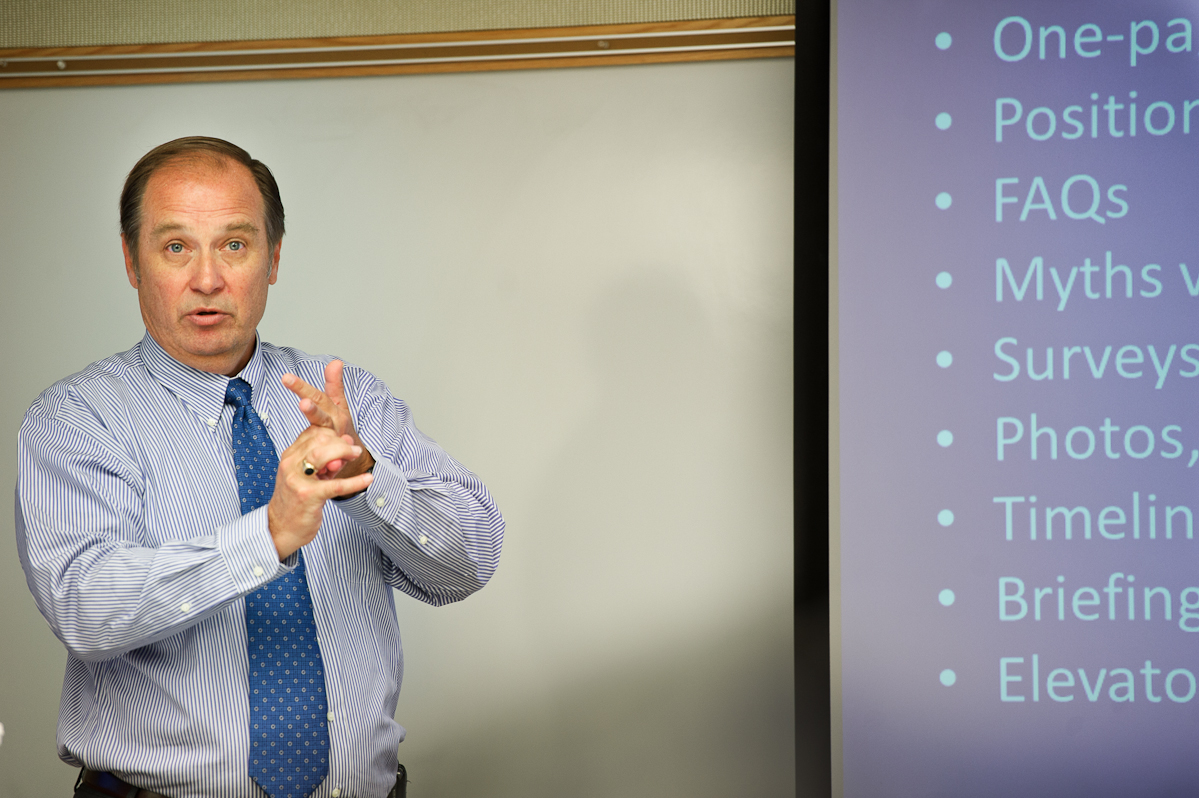
George Baker Jr. ’74 and Frank Vlossak ’89 have returned to Hamilton to share their real-world experience with 12 students through a unique Lobbying and Government Relations course. Baker and Vlossak, who hold the positions of distinguished lecturers of American Public Policy and Practice, previously co-taught the course in 2008.
Baker and Vlossak are both principals at William & Jensen, PLLC, a top-ranked lobbying firm in Washington, D.C. Baker joined Williams & Jensen in 1980 and has been a principal of the firm since 1983. Before joining the firm, Baker served as an attorney with the Office of Hearings and Appeals in the U.S. Department of Energy.
Vlossak joined Williams & Jensen in 1999 and became a principal of the firm in 2004. Prior to that Vlossak worked as a legislative assistant for Representative Merrill Cook (R-UT). Vlossak worked at Williams & Jensen as a legislative analyst before he attended law school.
The goal of the course is to supplement and build on the three years of standard academic coursework and internship experiences and prepare students to perform effectively in a professional work environment. This is accomplished through oral and written assignments similar to what the students will be expected to perform in an entry level lobbying, legislative or policy position.
The assignments were carefully chosen to expose the students to the research, communications and advocacy skills used in modern lobbying. Students are graded based on professional standards of excellence for entry-level post grads in D.C. Baker says that when he and Vlossak taught the class four years ago “the kids motivated themselves far in excess of what we thought was possible. We’re excited to see what the class comes up with this year.”
The 12-student seminar balances the academic lobbying perspective with Baker and Vlossak’s real-world experience on the Hill. Baker remarks “there is a world of difference between the academic view of lobbying and the practical reality of what’s done. In this class, we study the blood that pumps though the veins, the arteries and heart of real-life politics in D.C.”
The course reveals the honorable nature of the profession. Vlossak claims that many people think that lobbyists “can just snap their fingers and change a policy that wouldn’t otherwise be changed.” Baker explains, “Nothing could be farther from the truth…It really amounts to a lot of hard work.” Instead of glad-handing on Capitol Hill, lobbyists must sell the merits of their policy.
Consequently, they spend a great deal of time researching, writing and reformulating arguments on an hour-to-hour basis as new events reshape the matrix of the policy-making environment. In fact, Baker remarks, “lobbying is a wholly honorable and ethical enterprise in our society that represents the best in how government actually operates.”
The students enrolled in the seminar are well aware of the tremendous opportunities the course offers. Colin Hostetter ’13 says, “It's exciting to be able to complement the theoretical Government courses I've taken with a how-to class about the real world, especially one taught by experts in the field.” Elizabeth Amster ’13 wanted to take the course because “The lobbying aspect of the legislative process is grossly misunderstood and I wanted to learn more about if from people who actually do it on a daily basis. I’m hoping to learn real-world lobbying and legislative practices, and so far the class has exceeded my expectations.”
Amy Soenksen ‘13 remarks that this class has already given her a “better understanding of how lobbyists strategize and think, and regardless of whether I end up in the field of lobbying, the ability to think critically and strategically analyze will be a useful skill in the future.”
Both Vlossak and Baker observed that many of the skills they learned at Hamilton are essential to a career in lobbying. Baker points out that his life at Hamilton revolved around government courses and public speaking, which prepared him for a career in lobbying. Vlossak notes that many of his government courses laid the groundwork for his understanding of Capitol Hill. Both Vlossak and Baker attended Hamilton’s Semester in Washington program.
Vlossak and Baker have remained heavily involved with Hamilton since their graduation. Baker served as president of the alumni council and is the current chair of the Annual Fund. Until last year he was on the board of trustees where he chaired the Trustee Special Committee on the Career Center.
He was a key part of the dramatic restructuring of the Career Center to make Hamilton “best in class” for career placement services among liberal arts schools. For Baker, this class is an academic extension of this Career Center initiatives as well as a “very personal means of giving back to the College by sharing public policy experience I have gathered from 32 years of work with students who are preparing to enter the ‘real world’ upon graduation.”
Vlossak and Baker also provide great advice for students attempting to get a job in Washington after graduation. Vlossak emphasized the importance of taking advantage of the extensive network of alumni in the district, most of whom are happy to help new graduates. In fact, Vlossak jokes that he and Baker are the Ellis Island of Hamilton College; when recent graduates arrive in D.C., they all stop by Williams & Jensen.
Baker warns that if graduates want a job in lobbying, there is no one best way to achieve it. He mentions several pathways including working for members of Congress, federal agencies, trade associations and political campaigns among many others. In fact, he says, Hamilton students are “limited only by their own ingenuity, ambition, and drive.”
Posted October 16, 2012
